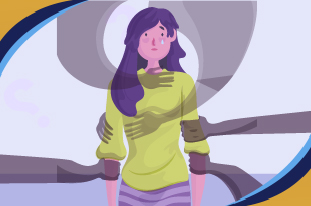Have you ever been pressured to do things that are harmful to you just because you wanted to fit in? If yes, you might have experienced peer pressure!
Approximately 85% of people around the world have experienced peer pressure. It’s an external force that imposes its decisions on you and forces you to follow them.
Peer pressure can be different, but it happens everywhere, whether it’s school, office, group of friends, or sometimes in our home. It severely impacts our mental and physical well-being.
However, peer pressure can occur at any age; it isn’t just a phase, it’s a lifelong phenomenon.
This article provides insights into what peer pressure is, its signs, types, and how it impacts our mental health.
What is peer pressure? Is it always negative?
The majority of people around the world have experienced peer pressure in their lives. Peers are the group of people who have a profound impact on us. Sometimes the influence can be a direct way or sometimes indirect, such as doing things in order to fit with others’ expectations.
Peers can be friends, classmates, colleagues, siblings, or even people on social media platforms.
Usually, the term “peer pressure” can be described in a negative way, but it also helps people to be influenced in a positive way. The positive impact makes the individuals study harder or be kind. On the other hand, the negative influence can make them carry a great risk, such as bullying others, being prone to drugs, and more.
Learn More on Emotional Intelligence:
Emotional Intelligence (EI) And Its Relationship With Mental Disorders
“Peer pressure is strong because humans are social creatures and can be influenced easily.”
What are the signs of peer pressure?
Peer pressure can be subtle to obvious, but here are some of the common signs that make the individual spot peer pressure.
- Changes in behavior
- Adopting new clothing styles
- Avoiding social gatherings
- Insomnia
- Risky behaviors
- Bullying others
- Withdrawing from family members
- Neglecting important tasks
- Cheating to get good remarks
- Low mood and energy
- Shopping addiction
- Games addition
- Gambling addiction

What are the types of peer pressure?
Peer pressure can be categorized into several types and can impact every individual differently.
Here are some of the common types of peer pressure.
1. Direct peer pressure
It is one most obvious form of peer pressure. An individual is provoked or forced by peers to follow their demands. The peers make them take on-the-spot decisions.
For example: if someone is having a glass of wine, they make the other person try it by saying, ‘Try it, take one sip, you’re behaving like a kid.
By making such comments, they will make the individual take the decision on the spot.
Read More About:
How To Improve Your Mental Health For Emotional Wellness
2. Indirect peer pressure
Indirect peer pressures involved being influenced by others. We automatically get influenced by the circle we socialize with. It makes the individual desire to become like their peers to fit in the circle or society. Individuals with indirect peer pressure follow their lifestyle, choices in clothes, and also their actions without any demand.
For Example, if someone in your circle has a specific hairstyle, you try to follow the same thing, or you want to get the same expensive items.
3. Positive peer pressure
Not everyone in our circle has a negative influence on us. However, some people encourage us to follow healthy activities, such as being kind to others, doing exercises, studying harder, etc.
For example: volunteering in new communities, helping people out in their hard times, studying together to get good grades, and adopting healthy activities.
4. Negative peer pressure
It is one of the common types of peer pressure, in which the peers influence the individual so much that they forget their morals and values. They get into the harmful activities in order to fit in with the circle.
For example: harassing someone, engaging in sexual activities, taking drugs or alcohol, skipping family commitments, and work.
5. Environmental peer pressure
This occurs through social media platforms or in the workplace. We all see things on social media, hatred about a specific thing, or following new trends, or bullying someone, which eventually leads to performing the same specific acts.
On the other hand, the peer pressure in the workplace makes individuals perform well in order to prove themselves hardworking, or become part of the gossip. Adults spend plenty of time working hard, on the weekends, or long hours at the office.
Get To Know About:
Recognizing the Signs of Emotional Manipulation
How Does Peer Pressure Negatively Impact Our Mental Health?
Peer pressure negatively impacts overall well-being and causes mental health issues.
Here are some of the mental health issues that can occur due to negative peer pressure.
1. Anxiety and stress
The constant urge to live up to peer expectations causes extreme anxiety and stress. Individuals remain in the mask of perfection; they dress in a certain way and engage in the specific demands of peers. They constantly remain in worry all the time, and this worry leads to social withdrawal and isolation. The extreme worry and isolation cause social anxiety, which can make daily social interactions a source of distress and fear.
2. Influence on Self-Esteem
Peer pressure greatly influences the self-esteem of an individual. Negative peer pressure makes you do things that are below the belt and severely impacts your self-worth. Individuals alter their behavior in order to fit in, which diminishes their values and dignity. On the other hand, positive peer pressure enhances self-worth and identity.
However, if one has to live on the expectations of others, they lose touch with their own self, which leads to worthlessness.
3. Depression
Constant pressure from peers causes anxiety, low self-esteem, and guilt that leads to depression. When individuals get rejection or bullying from their peers, it leads to hopelessness, prolonged stress, and withdrawal from social activities. Over time, these feelings contribute to major depressive disorder.
4. Shame and guilt
Due to the influence of peers, individuals do wrong, but internally they know they did an unhealthy thing, such as addiction to drugs and substances, cheating, and bullying. However, after some time, they realise their wrongdoings, which eventually leads to guilt and shame.
However, these emotions become a heavy burden on oneself and contribute to several mental health disorders.
5. Risky behaviors and their aftereffects
People who engage in risky behaviors due to peer pressure or just to fit in with the circle are more prone to develop mental health disorders. Taking substances for a longer period of time affects the brain and eventually leads to anxiety, depression, schizophrenia, and other mental health disorders.
How does professional support help in managing the effects of peer pressure?
Peer pressure can significantly impact mental health. However, it can be treated with the help of medications and therapeutic approaches, or sometimes the combination of both to get the desired treatment.
Medications
- Antidepressants
- Antianxiety
- Beta-blockers
Note: Only a mental health care professional can prescribe medications after diagnosing and monitoring the exact root cause.
Psychotherapies
Psychotherapies are also known as talk therapy, and are used to treat several mental health disorders. Here are some of the common therapies that will help in reducing the effects of peer pressure and its impact on mental health.
1. Cognitive Behavioral Therapy
Cognitive behavioral therapy is an evidence-based approach that helps in managing several mental health disorders, including anxiety, depression, and more. This therapy is based on the principles of thoughts, feelings, and behaviors that are interconnected. CBT targets unsettling thoughts and beliefs by intervening in thoughts and behaviors and changing them into helpful ones.
Cognitive behavioral therapy helps the person identify the intrusive thoughts that cause anxiety and challenge them in a way to reduce them.

2. Psychodynamic Therapy
It is a non-cognitive behavioral intervention. Psychodynamic therapy explores the patient’s past experiences and finds their link with the present emotions and behaviors. This is founded on psychoanalytical theory, in which a person’s unconscious emotions dictate their current thoughts and sentiments.
Short-term psychodynamic psychotherapy is distinguished from long-term psychodynamic therapy based on the duration of the therapeutic process and the number of sessions. STPP is conducted for less than a year and has fewer than 40 sessions.
3. Dialectical Behavior Therapy (DBT)
DBT is also a form of Cognitive behavioural therapy. DBT is for those people who are struggling with emotional distress. It is based on the idea that two opposing things can co-exist. In therapy, it means that you can accept your thoughts and emotions and still move on from them by changing them into productive thoughts and emotions.
In DBT, a person learns the skills of emotional regulation and distress tolerance. DBT is not the first-line treatment for treating anxiety & depression.
Get More Information about depression:
Knowing The Stages Of Depression For Better Living
4. Acceptance and Commitment Therapy (ACT)
Acceptance and commitment therapy is also a form of CBT. As the name suggests, this therapeutic technique involves the acceptance of thoughts or images. ACT works on the principle that thoughts themselves are not bad or problematic, but our dependence on them is taxing.
Moreover, according to ACT, the more we struggle against those unwanted thoughts, the more we find ourselves trapped in them. Therefore, through ACT, people find ways to see their thoughts as they are and help them to move on and heal.
5. Group Therapy
It’s a form of psychotherapy that helps to reduce feelings of loneliness and provides a sense of belonging and togetherness. It involves a secure, stable, and caring environment where a small group of people gather together and share their life journey with each other. It provides a structure in our lives and makes us learn, heal, and grow.
Group therapy is an evidence-based modality that can be helpful for people in many ways. Individuals who are struggling with misuse, anxiety, substance use, and divorce can get help from group therapy.
6. Family Therapy
Family members are often affected by the demands of the member who is struggling to manage peer pressure. The other members of the family need to be educated about peer pressure and how it impacts mental health, and how to help them in times of crisis. Therefore, in family therapy, the therapist involves the family members in the therapeutic process.
The therapist educates them and enhances communication among the members of the family. Moreover, families learn to help the patient deal with the symptoms of anxiety, depression, and other mental health disorders.
Did You Know:
Intellectualization Or Your Mind Controlling Emotions?
Last Remarks
Peer pressure is the influence of people with whom we socialize; it’s a formidable force. It can occur at any age, even in children, adults, and the elderly also influenced by their peers. Peer pressure has different types: negative, positive, direct, indirect, social media influence, or workplace.
Moreover, not all the time, peer pressure is negative; it has positive outcomes as well. If you spend more time with people who are kind-hearted, help others, or are good at studies, you may also start doing good things in life. However, if the peer pressure is negative, you start following their demands or copying the way they behave, you may start copying their hairstyles, dress codes, bullying others, and become prone to substances, etc.
Additionally, negative peer pressure leads to mental health disorders like depression, anxiety, and low self-esteem.
Begin Your Path To a Healthier Mind at Orange Coast Psychiatry
Do you want to be someone who goes along with things just to fit in? It could be the sign of peer pressure! The pressure to keep pace with others can easily make us lose our own path. Peer pressure is not something that we can escape from; it severely damages self-esteem and leads to mental disorders.
If you or someone around you is struggling to manage peer pressure or its consequences on mental health. Get help today at Orange Coast Psychiatry! We have a team of experts who provide evidence-based therapeutic modalities to meet your needs. Our board-certified psychiatrists provide counseling in a safe environment where you can talk about your issues without the fear of judgment.
Connect with our experts today!


















